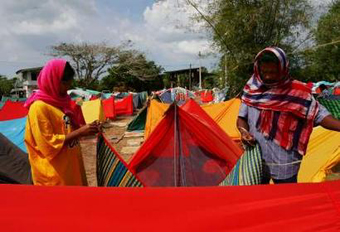We suffer no major disasters like a typhoon or an earthquake. We
consider ourselves quite lucky despite whatever shortcomings we may have.
So, when the Tsunami giant waves struck six southern provinces, it took
several days for Thais to come to grips with the extent of the devastation.
Psychologically, for this generation, we may never look at the affected six
southern provinces in the same light again, nor will we feel the picturesque
calmness of the Indian Ocean without suspicion of danger close by, poised to
strike at any time.

Thai tsunami
victims set up a tent at a refugee camp in Phang-Nga, north of Phuket,
Thailand January 9, 2005.
[Reuters] |
Historically,deaths from mother
nature's natural disaster in this country has been at most a few hundred. The
tsumani Thai dead toll may now reach more than 10,000. In one beach, called Khao
Lak in Phang-nga, next to the famed Phuket Island, as many as 4,000 might have
perished.
The place will become an awe of spiritual devastation. The incomprehension of
the disaster will impose a scar in one way or another on each Thai.
But the catastrophe has also brought the best out of the majority of Thais.
Public donations and offers to help have also been unprecedented in the six
provinces hit. Many of the 20,000 rescue workers who worked tirelessly during
the first week of the disaster were volunteers. Cabinet members led by Prime
Minister Thaksin Shinawatra were on the affected sites consistently to lend
their leadership and boost morale among doctors, nurses, rescue workers,
military personnel, government officials and volunteers.
Appreciations from foreign guests have poured in for the "extra" Thai
kindness shown in this tragedy. They were to be matched by generous donations
from individuals, organizations and companies to which HM The King aptly
extended his appreciation in his New Year speech.
Individual philantrapists have come forward on a scale never seen before.
Why?
Where natural disasters are concerned, this is the most geographically
extensive. The death toll has reached 150,000 and still climbing with an
estimated 5 million displaced persons.
On Boxing Day, just after the Sumatra earthquake and waves struck, the BBC
World Television Service started to beam scattered news reports and pictures of
the damage around the world.
During that week,millions of households across the world watched in horror as
the Tsunami became unimaginably more gruesome by the minute, relayed by still
pictures and videos taken by tourists local people, tourists and properties were
seen being swept by the waves across many previously pristine beaches, with the
video of the massive destruction of the capital of Aceh, Indonesia, capped it
all in terms of human tragedy.
Of course, of the areas affected, Phuket certainly has the highest profile
serving 1.2 million foreign tourists a year, the majority of whom are
Westerners. The devastation at Khao Lak, in the adjacent Phang-nga province, has
caught the attention of the world. Many Thais or expats, know someone or who
died, or had lucky escapes, or own affected businesses or properties there.
Thais were also drawn quickly into the disaster with the news of the death of
Khun Poom Jensen, the son of Princess Ubolratana.
The world has since arrived at the scene to support the biggest rescue in
human history. America will be appreciated in Asia for its role in this effort
which has come at the time when many world citizens question its values. Prime
Minister Thaksin Shinawatra's Thai Rak Thai Party now looks to score a landslide
victory on February 6 national election as it was seen to do its best and hardly
put a foot wrong in the past 10 days.
He may well, and rightly say some, be voted into power as the people of
Thailand reacted through the ballot box. Unfortunately, lives of millions of
Asians along the Indian Ocean coasts have lost their say, democratic or
otherwise, forever.